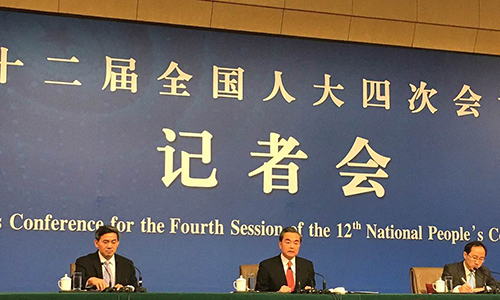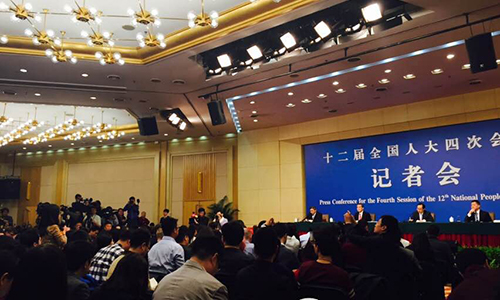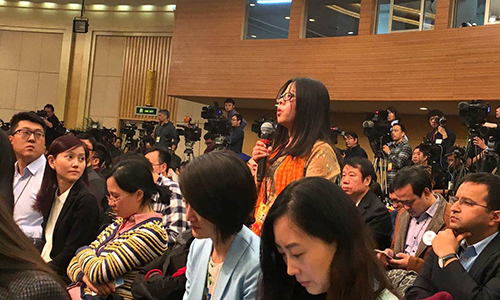China responsible, capable of implementing UN resolution on DPRK nuclear issue: foreign minister

Chinese Foreign Minister Wang Yi (center) meets journalists as he attends a press conference on China's foreign policy and foreign relations on the sidelines of the fourth session of China's 12th National People's Congress in Beijing, capital of China, March 8, 2016. Photo: Wu Yuanchun/GT
Chinese Foreign Minister Wang Yi said Tuesday China has the responsibility and capability of implementing the United Nations Security Council resolutions on the Democratic People's Republic of Korea (DPRK) for its nuclear issue.
"China is a permanent member of the UN Security Council. We have the responsibility and capability to implement various resolutions passed by the Security Council, including Resolution 2270 concerning the DPRK," Wang said at a press conference on the sidelines of the national legislature's annual session.
China will adopt an objective and impartial attitude to carry out necessary evaluation, determination and monitoring, said Wang, noting that Resolution 2270 not only contains sanctions, but also reiterates the support for the six-party talks and asks various parties to refrain from taking any action that might aggravate tensions.
"In China's view, Resolution 2270 must be implemented in its entirety. Sanctions are just necessary means, maintaining stability is the pressing priority, and only negotiation can provide a fundamental solution," the foreign minister said.
At the moment the tensions on the Korean Peninsula have been raising and the situation is a bit explosive. If the tensions worsen or even get out of control, it would be a disaster for all parties, Wang said.
As the largest neighbor of the peninsula, China will not sit by and see a fundamental destruction to the stability of the Korean Peninsula, and will not sit by and see unwarranted damages to China's security interests, according to Wang.
"We strongly urge all parties to act with reason and constraint, and refrain from aggravating tensions," said Wang.
"To eventually resolve the peninsula issue, we have to adopt multi-level approach and apply the right medicine. To have blind faith in sanctions and pressure would in fact be irresponsible to the future of the peninsula," he added.
In terms of negotiation, China has put forward a proposal to pursue in parallel tracks a denuclearization on the peninsula and the replacement of the armistice agreement with a peace treaty.
Denuclearization is the firm goal of the international community, replacing the armistice is a reasonable concern of the DPRK, the two can be negotiated in parallel, implemented in steps and resolved with reference to each other. This would be an equitable, reasonable and workable solution, Wang said.
Wang noted that other parties have also suggested some ideas, including flexible contacts in three-party, four-party, or even five-party formats.
"We are open to any initiatives that help bring the peninsula nuclear issue back to negotiations," he said.

Global Times reporter speaks at a press conference on China's foreign policy and foreign relations on the sidelines of the fourth session of China's 12th National People's Congress in Beijing, capital of China, March 8, 2016. Photo: Sun Xiaobo/GT

Global Times reporter speaks at a press conference on China's foreign policy and foreign relations on the sidelines of the fourth session of China's 12th National People's Congress in Beijing, capital of China, March 8, 2016. Photo: Sun Xiaobo/GT
Read more in Special Coverage:
